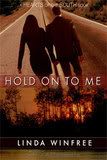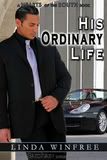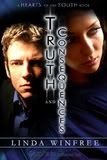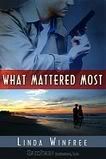Starting Where the Action Is
I read two books a while back--one major publishing house and one small press--that were labeled suspense but probably should have been called contemporary romance. In both the books, it took at least 200 pages to get to the present day, and also to get to the real meat of the story. I skimmed the NY house book to get to the end, but I kept putting down the small press book and going back to it later.
For me, the start was just too slow. As a writer, I've always been told to start the first sentence of the book in the middle of the action. Get the reader interested right away. As a reader, I have to say I agree with that advice. When I’m reading suspense—actually, when I’m reading anything, I want to step right into the thick of things. I want to be sucked in from word one.
Backstory can easily be threaded in throughout the novel, in very small chunks. As a reader, I don’t need to know every detail of the H/h’s childhoods. It slows the pace of the book, and a lot of it really isn't really necessary in telling the story. In these two books, the backstory had become an info-dump. Some of the information could have been given to the reader in bits, in the form of dialog or small snippets of internal thought.
I wonder if the authors had known their characters better, would they have needed to tell the reader about the years that had shaped them into the adults they’d become? If an author really knows her characters, inside and out, who they are should be clear to the reader through their actions and their interactions with each other, leaving a lot more room for what’s important in a romantic suspense—the plot, and the romance. This is where the real story is.
What are everyone's thoughts on this? Do you like to read about the characters' lives before they get to where they'll be in the present day, or would you rather get right into the action?
For me, the start was just too slow. As a writer, I've always been told to start the first sentence of the book in the middle of the action. Get the reader interested right away. As a reader, I have to say I agree with that advice. When I’m reading suspense—actually, when I’m reading anything, I want to step right into the thick of things. I want to be sucked in from word one.
Backstory can easily be threaded in throughout the novel, in very small chunks. As a reader, I don’t need to know every detail of the H/h’s childhoods. It slows the pace of the book, and a lot of it really isn't really necessary in telling the story. In these two books, the backstory had become an info-dump. Some of the information could have been given to the reader in bits, in the form of dialog or small snippets of internal thought.
I wonder if the authors had known their characters better, would they have needed to tell the reader about the years that had shaped them into the adults they’d become? If an author really knows her characters, inside and out, who they are should be clear to the reader through their actions and their interactions with each other, leaving a lot more room for what’s important in a romantic suspense—the plot, and the romance. This is where the real story is.
What are everyone's thoughts on this? Do you like to read about the characters' lives before they get to where they'll be in the present day, or would you rather get right into the action?







10Comments:
I'm having an interesting discussion with another writer about this at the moment. I tend to agree with you. Donald Maas says there should be no backstory before page 50, and while I think there are exceptions to that, I like to get into the thick of things immediately myself, and in the books I read.
I agree.
But I also have to point out that there is a difference between character developement and backstory...and sometimes character development requires backstory. And I aslo believe that character development shouldn't be cut for the sake of action, because if we don't care what happens to the character (meaning we are about the character him/herself), no amount of action will keep us reading.
Now, I'm not talking info dump, I'm not even talking a paragraph. It can be done in only a sentence.
Here's an example of a line in one of my heroine's povs: But the continued nightmares proved reclaiming a harmonious life and maintaining a safe environment involved as much internal change as it did external precautions.
That's it -- then we move on.
There's a lot of information in that one sentence -- backstory and character and plot.
Great topic, Elisa. One I think we know but don't always employ.
Michelle--You're right that there are exceptions. I've done it a few times in my own writing, but like you, I really prefer to get right into the action. *grin* the rest can come later.
J--I absolutely agree. I didn't mean to put character development on the back burner, just that it isn't generally necessary to have a 200 page block of backstory to show the character's background at the beginning of the book.
Like your example, character development can be shown very well through the character's internal thoughts, and it can also be threaded through their dialog and their actions and the way they interact with other characters.
I hope that makes a little more sense than my post. :)
Sorry, Elisa,
I totally agreed with your post -- didn't mean to make it sound like you left something out. You didn't -- well said. I just added that in because I used to think suspense = action and ended up leaving out the important character details. :-)
Actually, Theresa clued me back into that when we started critting together.
In my opinion, alot of writers don't understand what starting with action means. Personally, starting with action doesn't mean the big bang, or boom-- or action scene-- at least to me. It means starting in an interesting place, with foreward motion. A place that causes a shift in your character's life/ or understanding of his/her life.
I also believe that starting with sudden action, without an equal amount of time given to characterization disolves any tension the opening should bring. If I don't know the characters, I could care less what happens to them.
Quite honestly, I'll keep reading a slow opening if the characterization is strong, and I immediately connect with the characters. On the other hand, if the opening starts with a bang, but I don't get a strong sense of the character within the first few paragraphs, I won't keep reading.
I'm the 'another writer' Michelle was talking to about this. *g* I'd picked up 4 books from the library, 2 women's fiction, 1 mystery, and 1 historical romance. The WF and mystery were all in the protags voice, and each of them started off telling about the characters backstory. For me it was boring. The HR, by Cathy Maxwell, was the only one that didn't start with backstory, and the only one I ended up reading.
I can see putting hints of the backstory in dribbles, like Joan mentioned. I have an uptight protag, and she might cringe, thinking of what her parents would think of an outlandish character. And then the scene goes forward.
Great subject, Elisa!
Great topic, Elisa. And one that's near and dear to me with the revisions I'm doing.
I think J's right - that sometimes slower scenes create character development that integral to the story and getting to know the characters. I just finished a book that moved pretty fast, but because there were no slower scenes that developed character, I found myself not really caring what happened to the h/H along the way. In the revisions I'm doing, I cut a whole chapter that was slower because there was no real "action". Backstory was revealed through dialogue, and we learned more about the H/h's character, but because I felt like it slowed, I cut it. Turns out, when I reread, I realized that chapter WAS important and without it, the reader was left not caring about these people (me included!).
As for openings, it amazes me how sometimes the right action-packed or fast paced opening just comes to me, and other times (as with this ms) it's a struggle to find the exact right spot that has enough action and tension adn pulls the reader in in an interesting way.
Eli,
I never seem to find the right opening until the books been completed and I'm in the middle of revising. That's when the right opeing always seems to leap out at me.
then its a head-smacking (why didn't I see that before) moment.
No worries, J. :) I just wanted to clarify things a little better. It's funny, I don't write solely suspense, so I don't usually think of action in those terms. I was thinking of it more along the lines of the character's actions, rather than the action in the storyline. The things they do, the way they deal with other people.
T--I totally agree with you. Starting in an interesting place in a way that moves the story forward. Basically, starting where the story begins.
When I read, I tend to get bored if the opening is too slow. I think for me, there needs to be a good balance between storyline and characterization right from the beginning to pull me.
A friend of mine recently sent me a link to an excerpt from a NY published best selling author, along with the comment that it was a little slow. I read it and had to agree--the heroine was being followed by a creepy guy, and she was walking away from him thinking about her day at work and what she'd do later when she got home. It was the right place to start, but the action didn't fit the character.
Edie, the books I was reading started the same way. I couldn't get into the stories. And I also think backstory can be threaded into the story rather than told in one big chunk. It helps keep my interest.
Eli, I'm still working on learning to pace my stories. :lol: I tend to either cut all emotion and internal, or cut all the action. I'm working on getting a balance between the two.
Post a Comment
<< Home